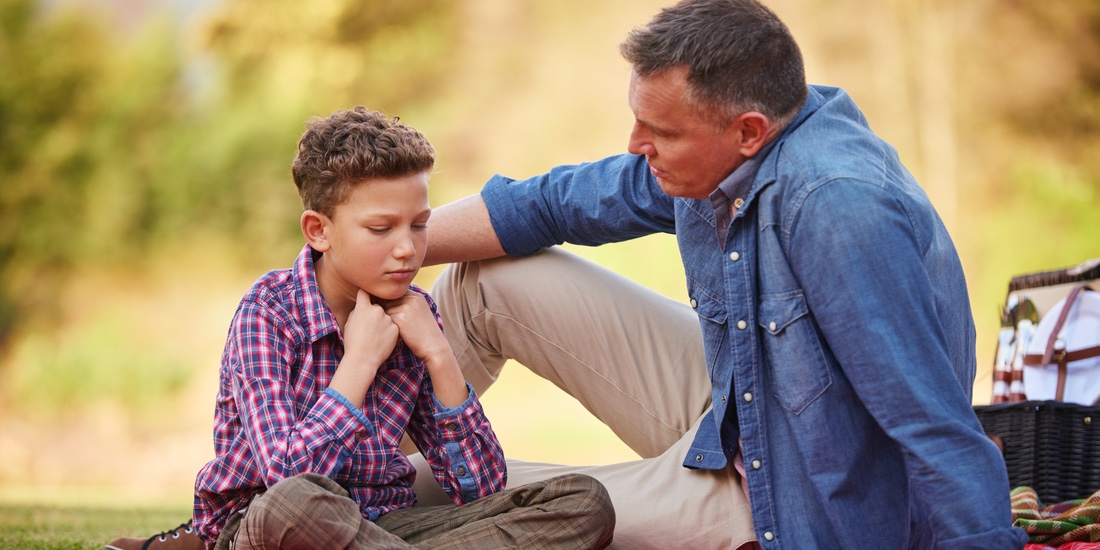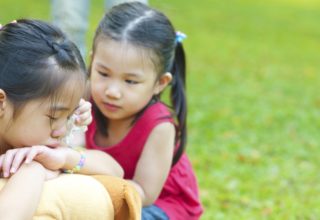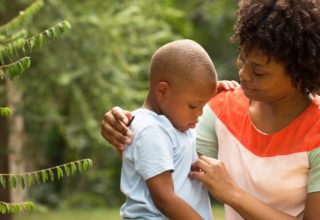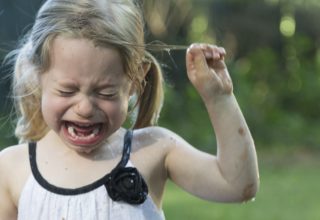Speaking with a child about death is an important, impactful, and often dreaded, teachable moment. Whether prompted by an actual loss or a theoretical wondering about this natural part of life, having a plan for helping your child learn about and process the idea of death ensures a positive, constructive conversation. Death is inevitable, and you play a valuable role in helping your child develop a healthy understanding of a challenging concept.
Learn
Consider the developmental age and maturity of your child when talking about death. A guideline for parents should be the younger the child, the more simple the conversation (i.e., use fewer details, fewer words, basic terms). You are the best judge of knowing what your child can understand.
Regardless of age, however, experts agree that euphemisms should be avoided.
- Telling a child that someone has “gone to sleep” can unnecessarily confuse a child (“Why can’t Grandma wake up if she’s just asleep?”) and can cause a negative sleep association (“Will I die if I go to sleep?”).
- Similarly, if someone who was ill has died, it is recommended to emphasize that the person was quite sick, lest the child become fearful that whenever they get sick, or a parent gets sick, they will also die.
It is likely that a child will have plenty of follow-up questions. Answer them directly and specifically.
- For example, if a child saw a dead rodent in nature with ants crawling over it and asked, “Why are ants eating the mouse?” a response could be: “The ants are eating the mouse. In nature, when a creature dies, other creatures eat its body so it can go back into the earth, and make the earth rich for new baby mice to live in.”
If you have experienced a loss, be honest with your child about how you are feeling. Normalizing the feelings associated with grief and loss, and letting your child see these emotions, makes it easier for your child to process death and develop a healthy association with loss.
When a child asks what happens after death, there are several approaches to answering this question.
- Some parents turn the question back to their child asking, “What do you think happens?” while others may say, “We don’t really know until we experience it.”
- Faith and belief systems may influence your response to this question, as will your child’s individual cognitive and emotional development. This is a great time to share your beliefs with your child, if you have not already.
Just Remember
- Avoid euphemisms. Children like facts. Be specific, but basic.
- Be honest, but comforting to your child. “I’m not going to die today. I am here for you now.”
- As a child processes grief and loss, they may insist on telling the story of the loss or asking questions about it repeatedly. This is a characteristic way of processing the concept.
Do
Useful Phrases
…When speaking to your child about what happens when people (or pets) die
| What Could Happen | What You Could Say |
|
|
|
|
|
|
|
|
Helpful Tools – Memorializing Activities
- Look at photos
- Draw
- Write letters or poems
- Keep a journal
Daily Tips
Experts recommend incorporating experiences with death into every day life, such as holding funerals for dead bugs and animals that a child might discover in the natural course of outdoor play.
- Encountering a dead or dying bug, to which most children are not emotionally attached, can make it easier to have a conversation about death. Explain the process of dying as a part of life that happens when our bodies get very, very sick or old and worn out. Inevitably, our bodies stop working.
- Hold a pretend funeral – A child could say something they appreciate about a bug or whatever their heart is feeling at that moment. Burying the bug can lead to a discussion of what happens after we die.
- Raise butterflies – This is another way to discuss life cycles and you can include death as part of the conversation. A butterfly garden is a great life cycle learning tool.

Paige Abramson Hirsch, Teacher + Education Consultant + Parent
Paige Abramson Hirsch is an elementary school teacher turned lawyer turned educational administrator and educational consultant supporting school districts and charter schools. Paige studied psychology with a focus in child development at Tufts University and holds a JD/M.Ed from the University of Minnesota. Paige previously served on the Board of HAND, a non-profit for bereaved parents. She lives in San Carlos, California with her husband and two young children, whom she thanks for providing her with endless opportunities to analyze child development and behavior!
There are times when it becomes necessary to speak to children about people in their lives who are very sick....
“Empathy is when you’re able to understand and care about how someone else is feeling.” -Mark Ruffalo, Sesame Street
A classroom favorite for cultivating empathy, kindness, community membership and awareness of others. What’s a real superhero? Someone who helps...
When your child starts demonstrating behaviors that show they are trying to ‘fit in’ or wants to ‘belong to a...
As parents and teachers of young children, we encounter ‘power play’ in a variety of ways – some children like...
“The way we talk to children becomes their inner voice.” -Peggy O’Mara
In the heat of an emotional meltdown, it’s hard to remember what to do. So we use *SKOR* for quick recall....
A breathing exercise to help your child move through the rocky moments in their day. Easy to do and remember....
Helpful phrases and scripts to respond to your child when they ask about other children’s challenges or about a child...









